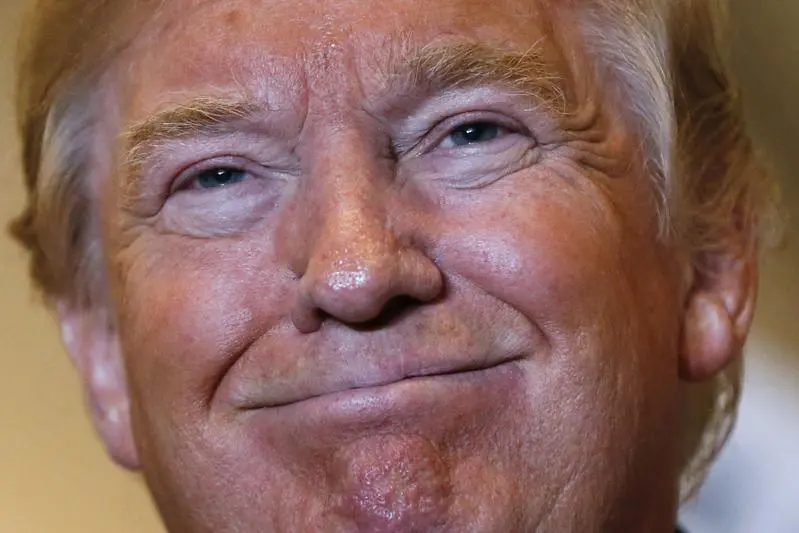PHOTO
(Updates with details from Trump's speech, Clinton campaign reaction)
By Steve Holland and Emily Stephenson
DETROIT/WASHINGTON, Aug 8 (Reuters) - Republican presidential nominee Donald Trump will propose tax breaks for working families and for corporations as he outlines his economic plans on Monday in an effort to regain momentum lost during a damaging spate of controversies.
The plan will include imposing a temporary moratorium on new federal regulations and reviving Transcanada Corp's Keystone pipeline project, according to an outline of his economic speech seen by Reuters.
The proposals in his speech in Detroit also include measures to simplify taxes for everyone, to dramatically reduce income tax and to "remove bureaucrats who only know how to kill jobs; replace them with experts who know how to create jobs," according to the outline.
Trump is scheduled to speak at noon EDT (1600 GMT) to the Detroit Economic Club, a traditional venue for political candidates to discuss their economic vision and whose members are area business leaders. His advisers have said he will focus on trade, taxes, immigration and regulation.
The Detroit speech will be Trump's first on the economy since announcing a 13-man team of economic advisers last week. It also comes after what was widely seen as his worst week as a presidential candidate for the Nov. 8 election.
Trump got entangled in days of dispute with the parents of a Muslim American soldier who was killed in the Iraq war and sparred with Republican Party leaders.
A Trump campaign aide, who asked not to be identified, said Trump's economic plan will lessen the tax burden on parents who pay for childcare because "we don't want it to be an economic disadvantage to have children."
Trump's plans also include proposing a 15 percent corporate tax rate, an idea that is on his website. The current corporate rate is 35 percent and Republicans have long sought to reduce it.
Trump will also propose stronger protections for American intellectual property and a temporary moratorium on new regulations, the Trump aide said. Trump blames an excess of red tape for stifling economic activity.
Trump's rough ride last week took its toll in opinion polls. A Washington Post-ABC News poll released on Sunday gave his Democratic rival, Hillary Clinton, an eight-point lead, 50 percent to 42 percent.
Clinton will offer her own economic vision in a speech in Michigan on Thursday. In a statement ahead of Trump's speech, her campaign said that his plan would give tax breaks to the wealthy and big companies, and would hurt working families and trigger a recession.
Members of Trump's advisory group shared their views on policy with senior Trump aides on Sunday in a conference call, said banker Stephen Calk, one of the members who took part.
Calk called Trump's vision for taxes the biggest tax revolution since changes under Republican President Ronald Reagan in 1986. He said the plan was to lower the corporate tax burden and encourage U.S. companies with operations abroad to repatriate profits at a reduced tax rate.
SEEKING MOMENTUM
Trump's Detroit event gives him a chance to regain the initiative and outline some substantive policy proposals.
The New York real estate developer, who has never held elected public office, touts his practical experience on economic matters and potential to create jobs, blaming President Barack Obama for what he calls a weak recovery from the 2008-2009 recession.
He will pledge to lower marginal tax rates on both large and small businesses and on all income classes, Larry Kudlow, an informal Trump adviser and CNBC commentator, wrote on CNBC.com. He will also propose an increase in the standard deduction for families and special deductions for childcare and the elderly, Kudlow said.
Trump has vowed to rewrite some international trade deals, including the North American Free Trade Agreement with Canada and Mexico that was signed into law in 1994 by Clinton's husband, then-President Bill Clinton. Critics blame NAFTA for costing American jobs. Peter Navarro, a University of California-Irvine professor who is the only formal Trump economic adviser with a deep academic background, noted that Detroit, home of U.S. autos, has seen a movement of auto manufacturing jobs to Mexico.
Trump, whose core support is among white blue-collar workers, has long targeted Mexico with a signature, controversial proposal to keep illegal immigrants out by building a wall along the southern U.S. border. (Additional reporting by Mike Stone in New York; Susan Heavey and Doinca Chiacu in Washington; Editing by Bill Trott and Frances Kerry) ((Steve.a.holland@thomsonreuters.com;
www.twitter.com/steveholland1
; 202 898 8300; Reuters Messaging: steve.holland.reuters.com@reuters.net))
By Steve Holland and Emily Stephenson
DETROIT/WASHINGTON, Aug 8 (Reuters) - Republican presidential nominee Donald Trump will propose tax breaks for working families and for corporations as he outlines his economic plans on Monday in an effort to regain momentum lost during a damaging spate of controversies.
The plan will include imposing a temporary moratorium on new federal regulations and reviving Transcanada Corp's Keystone pipeline project, according to an outline of his economic speech seen by Reuters.
The proposals in his speech in Detroit also include measures to simplify taxes for everyone, to dramatically reduce income tax and to "remove bureaucrats who only know how to kill jobs; replace them with experts who know how to create jobs," according to the outline.
Trump is scheduled to speak at noon EDT (1600 GMT) to the Detroit Economic Club, a traditional venue for political candidates to discuss their economic vision and whose members are area business leaders. His advisers have said he will focus on trade, taxes, immigration and regulation.
The Detroit speech will be Trump's first on the economy since announcing a 13-man team of economic advisers last week. It also comes after what was widely seen as his worst week as a presidential candidate for the Nov. 8 election.
Trump got entangled in days of dispute with the parents of a Muslim American soldier who was killed in the Iraq war and sparred with Republican Party leaders.
A Trump campaign aide, who asked not to be identified, said Trump's economic plan will lessen the tax burden on parents who pay for childcare because "we don't want it to be an economic disadvantage to have children."
Trump's plans also include proposing a 15 percent corporate tax rate, an idea that is on his website. The current corporate rate is 35 percent and Republicans have long sought to reduce it.
Trump will also propose stronger protections for American intellectual property and a temporary moratorium on new regulations, the Trump aide said. Trump blames an excess of red tape for stifling economic activity.
Trump's rough ride last week took its toll in opinion polls. A Washington Post-ABC News poll released on Sunday gave his Democratic rival, Hillary Clinton, an eight-point lead, 50 percent to 42 percent.
Clinton will offer her own economic vision in a speech in Michigan on Thursday. In a statement ahead of Trump's speech, her campaign said that his plan would give tax breaks to the wealthy and big companies, and would hurt working families and trigger a recession.
Members of Trump's advisory group shared their views on policy with senior Trump aides on Sunday in a conference call, said banker Stephen Calk, one of the members who took part.
Calk called Trump's vision for taxes the biggest tax revolution since changes under Republican President Ronald Reagan in 1986. He said the plan was to lower the corporate tax burden and encourage U.S. companies with operations abroad to repatriate profits at a reduced tax rate.
SEEKING MOMENTUM
Trump's Detroit event gives him a chance to regain the initiative and outline some substantive policy proposals.
The New York real estate developer, who has never held elected public office, touts his practical experience on economic matters and potential to create jobs, blaming President Barack Obama for what he calls a weak recovery from the 2008-2009 recession.
He will pledge to lower marginal tax rates on both large and small businesses and on all income classes, Larry Kudlow, an informal Trump adviser and CNBC commentator, wrote on CNBC.com. He will also propose an increase in the standard deduction for families and special deductions for childcare and the elderly, Kudlow said.
Trump has vowed to rewrite some international trade deals, including the North American Free Trade Agreement with Canada and Mexico that was signed into law in 1994 by Clinton's husband, then-President Bill Clinton. Critics blame NAFTA for costing American jobs. Peter Navarro, a University of California-Irvine professor who is the only formal Trump economic adviser with a deep academic background, noted that Detroit, home of U.S. autos, has seen a movement of auto manufacturing jobs to Mexico.
Trump, whose core support is among white blue-collar workers, has long targeted Mexico with a signature, controversial proposal to keep illegal immigrants out by building a wall along the southern U.S. border. (Additional reporting by Mike Stone in New York; Susan Heavey and Doinca Chiacu in Washington; Editing by Bill Trott and Frances Kerry) ((Steve.a.holland@thomsonreuters.com;





















